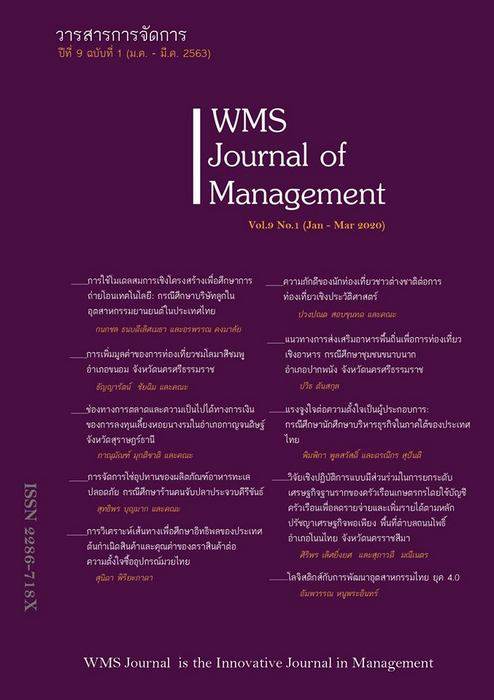Participatory Action Research to Enhance the Foundations Economic of Agricultural by Household Account for Cost Reduction and Increase Revenue According to the Sufficiency Economy Philosophy on Tambon Pho Road, Amphur Non Thai, Nakhon Ratchasima Province
Main Article Content
Abstract
The study had been proposed 1) to evaluation of financial context related to Household Account of agriculturist. 2) to problem analysis and Reinforcement the Household Account of agriculturist to steering the Sufficiency Economy Philosophy through Participatory Action Research. 3) to develop a financial planning that can expense reduction and increase revenue according from the Household Account to Enhance the foundations economic of agriculturist. This study is Participatory Action Research and key informant are agriculturist 9 village. The data were collected by field survey, questionnaire, focus groups, Activities to promote knowledge of accounting, Knowledge Sharing Activities and the follow-up for information.
The research found that: 1)The majority most of the agriculturist had debts from agricultural products and household expenses. Based on the financial context assessment of household account, it was found that based on the financial context assessment of farm household accounting, it was found that the village had highest level of knowledge, attitude and behavior about household accounting are the Ban Tanote. While, Ban Non pram had the least score on all sides. 2) the problem of the Household Account was that. Many agencies have come to the knowledge of accounting, but there is no follow-up process. In addition, personal factors include: Agriculturist lack of knowledge about accounting and had poor accounting attitude. and 3) the development of a financial planning model that can cost Reduction and Increase revenue the results suggested that people in community had participate the revenue and expense analysis. They had set up projects to increase revenue, expense reduction and follow up the results showed that agriculturist can use the information to financial planning to increase revenue and expense reduction include; grow vegetables. this research resulted learning future financial planning. which will enhance the foundations economic of agricultural to sustainable.
Article Details
References
Auepiyachut, W. (2017). Financial Literacy: Determinants and its Implications for Saving Behavior]. Journal of Humanities and Social Sciences, 25 (47) January – April, 67-93
Chetkhunthod, P., & Eapsirimetee, P. (2017). The Factors that Influenced to Behavior in Preparation Household Bookkeeping of the People in Sung Noen district, Nakhon Ratchasima Province. Journal of Nakhonratchasima College, 11 (1), January – April, 98-106.
Galtung, J. (1980). Self-Reliance: A Strategy for Development. London: Press of Villicrs Publications Ltd.
Inlakorn, S. (2005). kānngœ̄n bukkhon [Personal Finance]. Bangkok : Kasetsart University.
Krejcie, R.V., & Morgan, D.W. (1970, Autumn). Determining Sample Size for Research Activities. Educational and Psychological Measurement, 30(3), 607-610.
Klangsawat, C. (2009). kān plīanplǣng phrưttikam dān kānngœ̄n khō̜ng prachāchon thī čhattham banchī khrūarư̄an kō̜ranī sưksā nai khēt phư̄nthī tambon ʻāng thō̜ng ʻamphœ̄ mư̄ang čhangwat kamphǣng phet. [Changes in financial behavior of people who make household accounts Case study in Ang Thong Subdistrict, Muang District, Kamphaeng Phet Province]. Bangkok : Naresuan University.
Krutbunyong, C. (2012). kānngœ̄n thurakit [Business Finance]. Bangkok : Se-Education.
Likitwongkajon, N. (2007). Household Accounting : Tools to sufficiency economy. Academic Service Centre Khon Kaen University, 15 (3), 25- 29.
Lakkanawanit, P., & Dungtripop, W. (2018). Financial Literacy of Native Rice Farmers in Pak Panang Basin. WMS Journal of Management Walailak University,
7 (Special issue: July), 111 – 129.
Maitreechit, A. (2016). Acceptance of household accounting of the people in Ngewrai Sub-district, Nakhon Chaisi District in Nakhon Pathom. Journal of Chandrakasemsarn, 22 (42), January – June, 13-20.
Namphud, S., Jaroenjitrkam, A. & Wiwattana, S. bukkhon.l [Strategic personal finance management]. Bangkok : Thammasat
University.
Nilmanee, T., Pongput, S., Saewong, A., &Imchongchairak, O. (2015). kānsưksā phrưttikam læ saphāp panhā kānčhat tham banchī khrūarư̄an tām pratyā sētthakit phō̜phīang phư̄a lot panhā nīsin khō̜ng kasēttrakō̜n čhangwat prāčhīn burī [The study of behavior and Factor Problems on
household accounting of agriculturist in Prachinburi province]. Nakhon Pathom : Rajamangala Univerrsity of Technology Rattankosin.
Office of the National Economics and Social Development Board. (2017). National Economic and Social Development Plan 12 (2017 – 2021). Retrieved from https:// www.nstda.or.th/th/ publication/11247- national-economic-social- development-plan-12.
Parkatt, G. (2008). kānwāngphǣn læ kān phayākō̜n thāng kānngœ̄n (ʻēkkasān kānsō̜n chut wichā kānčhatkān kānngœ̄n ) [Financial planning,
control and research in Financial management]. Nonthaburi: Sukhothai Thammathirat University.
Pimonratanakan, S. (2012). kānngœ̄n sūan bukkhon [Personal finance]. Bangkok: Se-Education.
Pongwiritthon, R., & Janjaroensuk, N. (2013). Preparation of Household Accounting for Sustainable Community Development]. FEU
ACADEMIC REWIEW, 7 (1) June – November, 23-36.
Reungsinpinya, P. (2012). Home Accounting. MISJournal of Naresuan University, 7 (1), October – March, 20-28.
Sakhakorn, J. & Srijunpetch, S. (2009). kān banchī khanton [Principle of Accounting]. Bangkok : TPN Press.
Siwakuea, W., Saguanchat, D., & Bidaya N. (2010). kān banchī bư̄angton [Fundamentals of Accounting]. Bangkok : Chulalongkorn University.
Suksanguan, W. (2010). lakkān banchī chanton [Principle of Accounting].Bangkok : M&M Laser print.
Tantiwetchakul, S. (2007). lak tham lak tham tām rō̜i phrayukhonlabāt [Dharma Principle Make Principle in His Majesty's
Footsteps]. Bangkok: Dansutta Printing.
Thaweecha, S. (2013). Integral household accounting for accounting wisdom encouragement according to philosophy of sufficiency economy: a case study
ofbanklang community, khayoong subdistrict utumpornpisai district, sisaket province]. Graduate studies journal,10
(48), May-June, 7-16.
Wasi, P. (2007). sētthakit phō̜phīang læ prachā sangkhom nǣothāng phlikfư̄n sētthakit læ sangkhom [Sufficient Economy and Civil society the socio-economic
recovery]. Bangkok: Moh- Chao-Ban Publishing House.
Wichitsathia, S. (2014). Developing Household Accounting Firms and Accounting Procedures Based on Sufficiency Economy Approach]. Suranaree Journal
of Social Science, 8 (1) January – June, 95 – 11.


